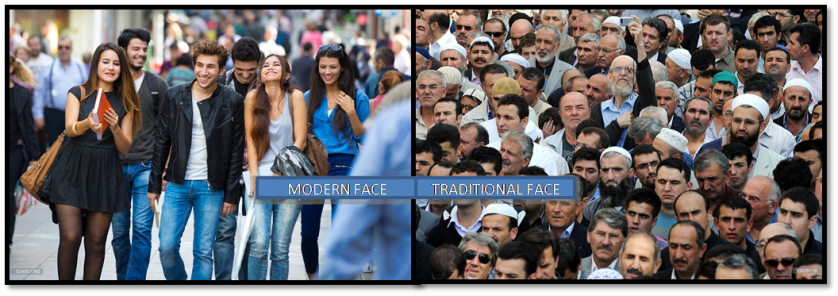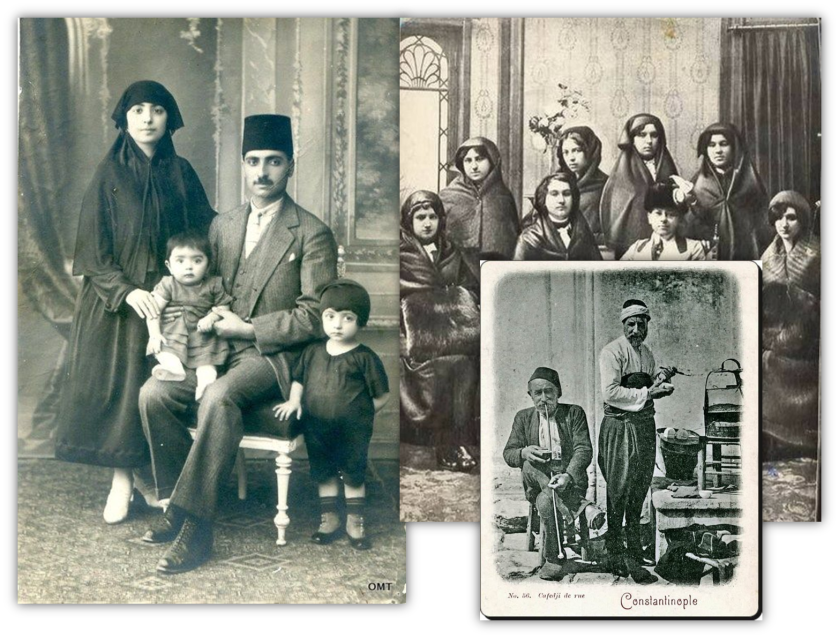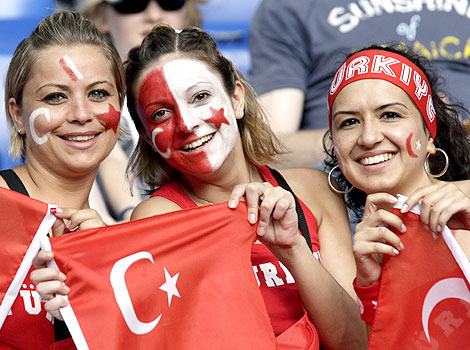Think about a country that is 96% Muslim (I believe in reality this number is way lower than the official one), and although alcohol is forbidden by their religion, their national drink is ‘Rakı’; a hard liquor with 40% alcohol. Imagine a country that ranks in the top 5 most Facebook users, top 10 most YouTube users, and top 6 most WhatsApp Users in the World, and yet still prefers socializing mostly by going out with their friends, no matter how broke they are, and paying random visits to their neighbors or family members. A country that follows the latest technological trends, buys the latest version of their favorite cellphones, but still uses a printed plane ticket rather than a QR code at the gate because it feels ‘safer’.

Think about a country that admires, respects their gay and transsexual music stars deeply, but when their own family member admits that they are homosexual, it is (in most families) absolutely unacceptable.

When I tell you ‘think about China’ or ‘Think about the USA’ or ‘Think about Kenya’ or ‘Think about France’ what do the people look like? What is the religion like? How about the culture? Which continent are they located in? You have most of the time a somewhat clear picture in your mind. But when it comes to Turkey… The picture gets a little blurry for everyone.
My country, Turkey, has been in so-called identity crisis since its birth in 1923. This makes me sad because Turkey has SO MUCH potential to thrive, to be unique, to be successful in many many ways. However, In my opinion, it is this so-called identity crisis that is preventing it from moving forward.
I’m pretty sure some people will be surprised or maybe even upset that my very first post about Turkey is not about how breathtaking its nature is or how its history is mind-blowing. I will talk about those later for sure. But first, I chose an issue that I have been wanting to write about for a long time. I’m not a historian, politics major or sociologist. Thus, only my opinions are discussed here. I just want to make sure that nobody gets offended since I’m going to touch on some sensitive topics here.

Turkey is one of the two countries in the world that has its soil on two different continents (the other one is Russia): Europe and Asia. So can we count Turkey as one of the eastern or one of the western cultures? Culturally speaking, it would be safe to say my country is a lot closer to Asian cultures than European ones; highly hierarchical, collectivist, and engraved with very old roots of traditions. Turkey was the home for some of the oldest civilizations that are known: Hittites, Lydians, Ionians, and Urartus. Also, it was home to Byzantines, Romans, and finally, Ottomans. Each of them worshiped different Gods, lived under different rulers with different rules. Years of immigration from Asia – including east Asia and the middle east-, European countries such as Macedonia, Bulgaria, Greece, Romania, Hungary created such an interesting mixed blend.

Since the Republic of Turkey was founded by one of the greatest minds ever existed on Earth, Mustafa Kemal Ataturk, a lot of things have changed. When he ended the monarchy and brought democracy, I think Turks were not ready for this change yet. It was a huge step forward, which I will explain here later. Ataturk changed the alphabet from Arabic script to Latin alphabet so that we could improve in world literature, science and technology. He shut down religious schools so that the focus would be science and there would be equality between women and men. Ataturk reformed the clothing style from a traditional to a western look, so that we could set our eyes on more modern. He knew that how we look represented how we think. So we needed to change. He gave voting rights to women before Italy, France, Switzerland, Japan, or China did. By the time 19th Amendment granted the ballot to American women, it was 1920. But let’s remember, the USA was founded on July 4, 1776 and when demand for the enfranchisement of American women was first seriously formulated at the Seneca Falls Convention, it was 1848. So America waited 144 years whereas Ataturk did this in just about 10 years. That is why these quick changes were not very welcomed by some traditional and/or conservative Turks.

- Ottoman Fashion Before Ataturk’s Clothing Reform

His reforms, victories and patriotism are the reasons why most of the Turks have been thankful to him. Unfortunately I said ‘most’, because there was a considerable amount of Turkish people who didn’t like what Ataturk did. They didn’t like this change at all. They felt like they were suppressed. Even though there was the freedom of religion, freedom of thought, this group of people didn’t like the fact that religious schools and institutions were shutting down, the religious outfits were gone, and Arabic script, in which the original language Quran was written, was all gone. All happened in a relatively very short period of time as well and that created uneasiness among people.
Another possible reason for Turkey’s identity crisis might be the ‘Nationalistic Indoctrination’ that Ataturk had to implement those days in order to build a republic from scratch. Because he needed a reason to unite everyone against the Monarchy (Power of Sultan) and knowing the behavior and culture of the Turks very well, nationalistic approach was the best way to go: modern nation had to become homogeneous in terms of culture, religion, language and national identity. This meant bad news for minorities. Especially for the Armenians, Greeks, and Kurds. They paid a price while Turkish Republic was being born. It’s my belief that with the early death of Ataturk at the age of 57, a big void had opened in Turkey’s heart. People in charge thought to themselves: “Everything is still new, Ataturk would have known what to do, how to run the country, how to bring back all those minorities together, but now… He is gone!! What the heck are we going to do??”. This early loss and the dependence of the baby republic to its father created a big big problem later in shaping the identity of the nation.
The mourning Turkish nation after ‘Father of Turks’ Ataturk dies on November 10, 1938.
Without a ‘father’ figure, Turkey was lost: the baby republic had just lost the only parent it had. Now, it was going to grow up with self-esteem problems, and it will have painful, angry adolescence years… Actually by the end of this post you will have realized that Turkey would never learn from its mistakes or, in other words, would never actually be a grown up due to its relentless search of another ‘father figure’.
1960, 1962, 1971, 1980, 1997, 2007, 2016… Marks the military coups and military coup attempts in Turkey. In one of which, the president of the country was hanged in public. Many arrests, torture in investigations, lost jobs, soldiers wandering around the streets with machine guns and tanks. These caused instability and fear in the nation and as we all know, fear eventually leads to wrong decision making.

Since the beginning, we have been divided, constantly: Students fought with police, ‘Sunni’s fought with ‘Alevi’s, leftists and rightists killed each other, military was against the government, Kurdish vs. Turkish, women with veil vs women without veil, and now, pro-government conservatives versus anti-government democrats. We have been always and we still are…DI-VID-ED.
The assassination attempt for Pope John Paul II took place on Wednesday, 13 May 1981, in St. Peter’s Square at Vatican City. A Turkish extreme nationalist Mehmet Ali Ağca was the assassin who murdered left-wing journalist Abdi İpekçi on 1 February 1979, and later shot and wounded Pope John Paul II in 1981, after escaping from a Turkish prison. This opened a whole can of warms. Later, in the light of a highway accident, the Turkish nation learned about the existence of ‘Secret State’: a combination of nationalists, mafia, police and the rich: On the surface, the government was ruling, but the secret state was the one who was actually running the country.
Journalists who attempted to investigate ‘Secret State’ later, were all going to be assassinated so that nobody else could dare to write about them again.
Many singers, journalists, writers, poets (including the writer of the Turkish National Anthem) were forced into exile. Most of them died far away from their own land.
Now for the past 15 years, the same single party has been ruling us; The conservative ‘Justice and Development Party’ won the elections in 2002, 2007, 2011 and 2015 with almost 50% of the votes (again you can clearly see that we are divided). My country is clearly deteriorating in the hands of a dictator leader and this 50% is OK with that. The current President, and 3-times-elected former Prime Minister Erdogan knows how to manipulate Turkish nation, so well that in every speech of his, he mentions ‘us’ and ‘them’ and each time, the number of his supporters grows. He says: “We are the good ones (conservatives), we are hard workers, we are villagers, laborers, farmers, and they (meaning democrats) are mocking us! they are terrorists, anarchists, OR alcoholics, atheists, OR they are rich and educated, they think they are better, smarter than ‘us'”
Why I mention Erdogan here is the fact that how well he used this ‘identity crisis’ of Turkey for his own good to become the absolute power:
- He knew that with the failing coalitions and the former disastrous female prime minister, and for the obvious historical reasons, Turkish people would vote for a ‘self sufficient’ ‘male’ figure with a ‘strong personality’.
- In the beginning of his term he was talking about reuniting with minorities; he played us well. The first time he was elected, he re-opened an Armenian church in Van after 100 years, he lead the way to open a Kurdish TV channel and a radio station. He seemed friendly, fatherly, kind of liberal-conservative. Economy was improving and unemployment rate was diminishing. Then in just a few years, everything has turned and he revealed his and his party’s real identity. He started to suppress the media, arrested people as he liked, tried to raise drinking age to 24, made the relationship with Kurds worse, opened more and more religious schools, stole money from the government assets, made the judicial system corrupt, and so on.
- He was aware of the fact that we had been going through self-esteem problems: We were not ruling the world like once Ottoman Empire did and we were not as strong anymore as in those times Ataturk brought us together, we were weakened by military coups and fights between divided groups. Having been rejected by European Union so many times, we were feeling frustrated, degraded. He saw this status quo as an opportunity to promote himself as a hero and in his hate speeches he made it clear that: “We don’t want Europe, we don’t need European Union”. Suddenly everybody was in agreement with him as if they were all hypnotized: “Yeah! Why do we need Europe?” He literally finished almost our all relationship with the West and he pushed us towards the Middle East, where people adore him and he could reign like a king.
- He was aware of that suppressed anger people had towards Ataturk and his democratic republic. He used this in his speeches, everywhere he went.
- He knew well that he could divide us pretty quickly. With the chaos he created each time, he knew he would split the opposition parties’ votes.

I feel like Turkish nation has been in some sort of Stockholm Syndrome, which is a condition that causes hostages to develop a psychological attachment with their captors as a survival strategy during captivity. Psychologist, former FBI agent Thomas Strentz states, “the victim’s need to survive is stronger than his impulse to hate the person who has created the dilemma.” A positive emotional bond between captor and captive is a “defense mechanism of the ego under stress”. Some of the people who voted for him in the first place want to keep him in power because they are afraid that without Erdogan, everything will be worse, they will lose their jobs, their food, their lands. The sad fact is, everything has already been going downhill, but their denial is blindfolding them.
Final words… Here comes the question: Now what? When is this problem with our identity will be solved? My answer is when we stop looking for one. Maybe we don’t need to belong west, or east. Maybe we should create our very own identity. Call it ‘Turkish Way’ of doing things. An identity that cares for others, value family, respect people, works hard, thrives for advancement, improvement, production, believes in religion and respects non-religion, sees people through without labeling them, known as being self-sufficient and self-confident. But most importantly, an identity that doesn’t require a savior, a leader, a father figure to function…
As Ataturk said: “If you feel desperate one day, don’t wait for a savior. Be the rescuer yourself.”
“Şayet bir gün çaresiz kalırsanız, bir kurtarıcı beklemeyin. Kurtarıcı kendiniz olun.”
Mustafa Kemal Atatürk
-Ece

